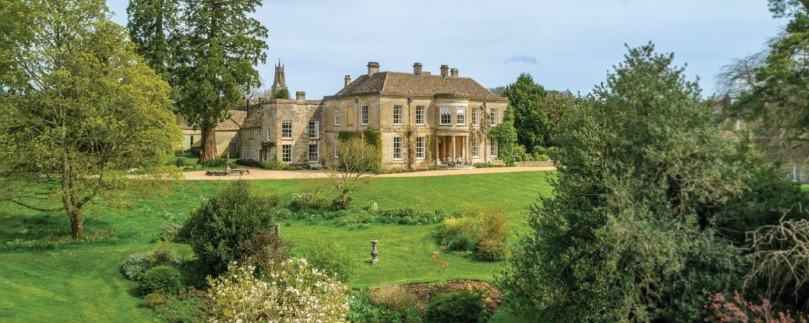
WHEN the invading Roman army arrived in the Cotswolds some 2,000 years ago, they found a region of gentle hills, valleys and streams and a climate of chilly winters and springs. They brought hardy sheep to raise for wool to keep themselves warm and, when they left, the flocks passed into the hands of local landowners: first the Church and then local families. In the Middle Ages, sheep grazed the hills and valleys of the Cotswolds, fleeces from a million Cotswold longwool sheep were traded and fortunes were made. Rich merchants created a landscape dotted with the lofty spires of wool churches and marketplaces surrounded by grand townhouses.
The coming of the Industrial Revolution in the mid 1700s saw the emergence of Stroud and its surrounding valleys in the southwestern Cotswolds as a focal point of the industry, thanks to its many fast-flowing rivers that, at one point, powered some 170 mills in the area. The ancient market town of Minchinhampton, which stands on a hilltop four miles south-east of Stroud, derives its name from the Old English heatun meaning 'high town' and mynecen, meaning 'nun', having been granted by William the Conqueror to the Convent of the Holy Trinity at Caen, Normandy, in 1066. The Norman nuns held Minchinhampton for more than 300 years until, in 1415 (the year of Agincourt), the Crown confiscated all foreign-held ecclesiastical assets. The manor of Minchinhampton was later transferred to the Brigittine Abbey of Syon in Middlesex, which remained in possession until the Dissolution in 1534.
Grade II*-listed The Lammas, a classic, Georgian house set in more than five acres with mature trees and wonderful valley views, is on the site of or near the manor acquired by the Minchinhampton nuns. Rupert Sweeting of Knight Frank (07836 260236) and Ed Sugden of Savills (07557 337507) are joint agents for its sale, for which they quote a guide price of $7.5 million.
This story is from the May 08, 2024 edition of Country Life UK.
Start your 7-day Magzter GOLD free trial to access thousands of curated premium stories, and 9,000+ magazines and newspapers.
Already a subscriber ? Sign In
This story is from the May 08, 2024 edition of Country Life UK.
Start your 7-day Magzter GOLD free trial to access thousands of curated premium stories, and 9,000+ magazines and newspapers.
Already a subscriber? Sign In

Give it some stick
Galloping through the imagination, competitive hobby-horsing is a gymnastic sport on the rise in Britain, discovers Sybilla Hart

Paper escapes
Steven King selects his best travel books of 2024

For love, not money
This year may have marked the end of brag-art’, bought merely to show off one’s wealth. It’s time for a return to looking for connoisseurship, beauty and taste

Mary I: more bruised than bloody
Cast as a sanguinary tyrant, our first Queen Regnant may not deserve her brutal reputation, believes Geoffrey Munn

A love supreme
Art brought together 19th-century Norwich couple Joseph and Emily Stannard, who shared a passion for painting, but their destiny would be dramatically different

Private views
One of the best ways-often the only way-to visit the finest privately owned gardens in the country is by joining an exclusive tour. Non Morris does exactly that

Shhhhhh...
THERE is great delight to be had poring over the front pages of COUNTRY LIFE each week, dreaming of what life would be like in a Scottish castle (so reasonably priced, but do bear in mind the midges) or a townhouse in London’s Eaton Square (worth a king’s ransom, but, oh dear, the traffic) or perhaps that cottage in the Cotswolds (if you don’t mind standing next to Hollywood A-listers in the queue at Daylesford). The estate agent’s particulars will give you details of acreage, proximity to schools and railway stations, but never—no, never—an indication of noise levels.

Mission impossible
Rubble and ruin were all that remained of the early-19th-century Villa Frere and its gardens, planted by the English diplomat John Hookham Frere, until a group of dedicated volunteers came to its rescue. Josephine Tyndale-Biscoe tells the story

When a perfect storm hits
Weather, wars, elections and financial uncertainty all conspired against high-end house sales this year, but there were still some spectacular deals

Give the dog a bone
Man's best friend still needs to eat like its Lupus forebears, believes Jonathan Self, when it's not guarding food, greeting us or destroying our upholstery, of course